Prototype Swifts
(and
the Johnson Rocket 125)
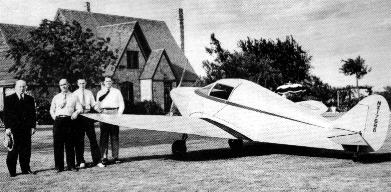
GC-1
Serial Number 1 NX17688
Texan
R.S. "Pop" Johnson could be best described as the
"Jim Bede" of the 1940s. His 1941 "Swift",
has been described as a homebuilt variation on the Culver
Cadets that Johnson sold for a living in Texas and elsewhere.
The airplane's design also had a lot of input from one Al
Mooney, the Cadet's designer. In any case, this is the airplane
that brought Johnson and Globe Aircraft's founder John Kennedy
together. This airplane had an 80hp Continental engine with
a Beech Roby prop. It was alleged to be able to fly at a cruise
speed of 130mph, max speed of 145mph, up to 16,200 feet, and
cover 600 miles in the process. This airplane was reported
" scrapped" by Globe in 1942 but was actually reclaimed
from Globe by Pop Johnson and the airframe used
for the prototype Johnson Rocket.
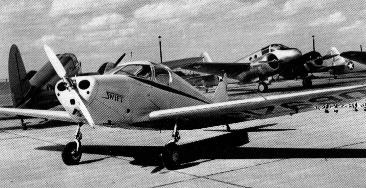
GC-1
Serial Number 2 NX17690
This aircraft was Globe's
production prototype and was introduced in July 1941. It was
certificated by the CAA in 1942 (ATC 753). This airplane was
promoted heavily until the Japanese decided to pursure their
concerns with the U.S. Navy in December. The Swift went to
the "back burner" while Globe geared-up to build
Beech AT-10 multi engine trainers under contract. But as the
war was drawing to a close, Globe's Chief engineer Kilbourne
H "Bud" Knox took this airplane and converted it
into the GC-1A prototype, serial number one (NX17640).
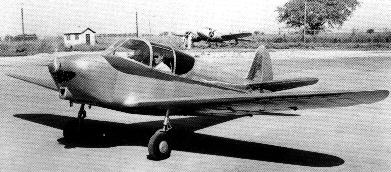
GC-1A
Serial Number 1 NX17640
Combining wood
and metal construction and a Continental C-85 engine, the
heavily modified GC-1 s/n 2 emerged as the "New Swift"
in 1944. It would turn out to be the first postwar personal
light plane design to be publicly announced. It too was heavily
promoted but the decision makers at Globe had concluded that
metal was the way to go so...
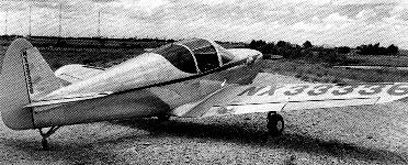
GC-1A
Serial Number 2 NX33336
Bud Knox's "All
Metal" Swift. Serial number 2 was the true beginning
of the line.
This Swift still exists in airworthy condition.
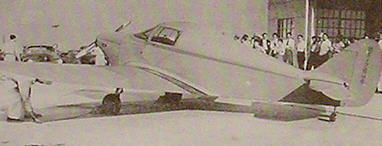
GC-1 Serial Number 1 NX17688
becomes the prototype
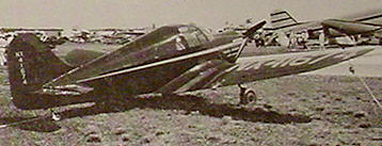
Johnson Rocket 125
==========
DID THE POP JOHNSON/GLOBE "GC-1 s/n 1"
BECOME THE PROTOTYPE JOHNSON ROCKET???
In the April 2003 Swift Museum Foundation newsletter, SMF
President Charlie Nelson addressed the possible connection
between the Pop Johnson designed and built Globe GC-1 s/n
1 and Johnson's prototype Johnson Rocket. The restored Rocket
was at Sun n Fun this in 2003 and the two photos Charlie published
in the newsletter showing the GC-1 "way back when"
and the Rocket at SnF were quite provocative! I emailed Swift
historian Allan Erickson <swiftalbon@earthlink.net>
regarding
his thoughts and he directed me to a story in the September
2001 issues of his So-Cal Swift Wing Newsletter. Here is the
story...


SWIFT/ROCKET SPECULATION (SCSW Newsletter, September 2001)
Most of you are probably familiar with the prototype Johnson
Rocket because of its almost identical appearance to the war
years X model wooden Swifts. The Rocket has been completely
restored by Leonard McGinty of Thonotoasassa, FL. It is based
at the Zephyrhills Florida Municipal Airport and is for sale
for $100,000. Both wooden Swifts were designed by Pop Johnson.
It is interesting that the first wooden Swift NX17688 s/n
1, was scraped on April 14, 1942, the same time that Pop Johnson
left Globe. Four months later, on August 10, 1942 Johnson
applied for registration for the Rocket prototype. Three months
after that, on November 23, 1942 and on the same airfield,
Pop Johnson had an almost identical airplane flying, the Johnson
Rocket Prototype. Even more interesting is the fact that in
the 60’s the Rocket was based here on the West Coast and was
owned by Robbie Robinson who is now at Whiteman Airport. Robbie
stated that he was told that the Rocket was in fact built
from one of the Globe Swift prototypes. How is it that this
rumor followed this airplane from Texas to California?
The present owner doubts that this airplane could be one of
the Globe’s. The Rocket has a fabric covered fuselage and
wooden wings whereas the Swift had a wooden fuselage and fabric
covered wings. But consideration must be taken in as to how
(Globe Chief Engineer) Bud Knox modified the second wooden
Swift NX17690, s/n 2, to become NX17640 which was the true
prototype for the production Swift. ‘690’s fuselage went from
wood to a metal cover on top with fabric covering the sides
and bottom. The wings appear to have been covered with wood.
The only way these airplanes were identified as being the
same was by the CAA documentation.
The point being made is that Bud Knox modified the 690 airframe
from that of wood to one of wood, fabric, and metal, the same
as the Johnson Rocket. Pop Johnson could have done likewise
with wooden Swift NX17688 s/n 1, upgrading the engine and
the airframe to become the Johnson Rocket. It is unlikely
that Pop could have built the Rocket in seven months from
scratch. Remember this was war time, nothing was to be had,
not even balsa wood (Mosquito Bombers). This is speculation...
But reasonable speculation.
I want to thank Mark Holliday, I think, for bringing this
subject and these airplanes once again back into focus. There
may never be an answer on this and then again there may still
be a Globe employee left out there who can say yes or no.
Pop Johnson’s rocket is a beautiful little airplane. Mark
Holliday saw the Rocket at Sun n Fun several years ago and
showed interest in adding it to his stable but if I remember
right, he purchased a Cessna 195 instead. Geeez! Hope this
airplane ends up in a Swifter’s hangar or in the Swift Museum
Foundation. -- Allan Erickson, Sept. ‘01
Next we have an email from Orval Fairbairn, an owner of a
Johnson Rocket...


Subject: Swift Newsletter, Swift/Johnson Rocket Relationship
From: Orval Fairbairn <orfairbairn@earthlink.net>
I have Johnson Rocket 185 S/N 11 and am aware of the Pop Johnson
relationship to the Swift. After talking at length to Charlie
Nelson at Sun 'N Fun and parking alongside him and the prototype
Johnson Rocket taildragger there, and after reviewing the
Swift Website, I am now convinced that the Rocket 125 was
originally the GC-1 Swift, rebuilt as a different airplane
-- namely the Rocket 125. Differences appear in the engine/cowl
installation and the vertical fin/rudder. The rest of the
plane appears to be the same. It is also curious that the
first five Rocket 185s carried registration numbers NX(C)
33339 through 33344, and that the first metal Swift was 33340.
I don't know when the switch on that number took place, however.
Please sign me up for your discussion/email list. Orval R.
Fairbairn, Daytona Beach, FL
Finally a comment from SMF President Charlie Nelson in the
May 2003 SMF Newsletter...


"We find it very interesting that Globe salvaged and
de-registered the GC-1 (s/n 1) in April of 1942. Four months
later, Mr. Johnson, as Johnson Aircraft applied for a registration
of the Johnson Rocket prototype s/n 101. Remarkably similar
to the GC-1 except there had been a very unusual extension
of the vertical fin area to accommodate the increased HP for
the O-290 engine. That extension exists on the Rocket prototype
today. As this evolves, it is quite clear to me, the GC-1
became the Johnson Rocket tail dragger prototype. The mystery
now is what became of the quite different GC-1A s/n1 designed
by Bud Knox and built by the Globe Aircraft Corp."
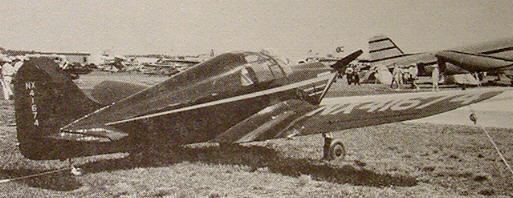

THE GLOBE TEMCO SWIFT STORY by Stanley G. Thomas...
THE FIRST FIFTY YEARS OF THE SWIFT by The
Swift Museum Foundation...
and the efforts of So Cal Swifter ALLAN
ERICKSON...
provided the information for this page.

Back
to Swift History Index

|

